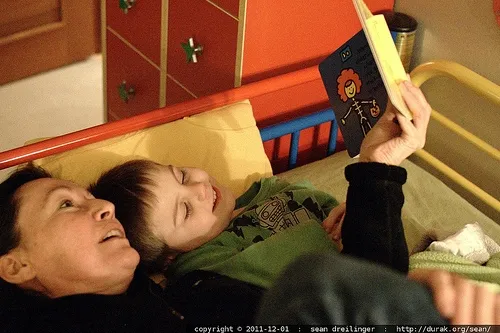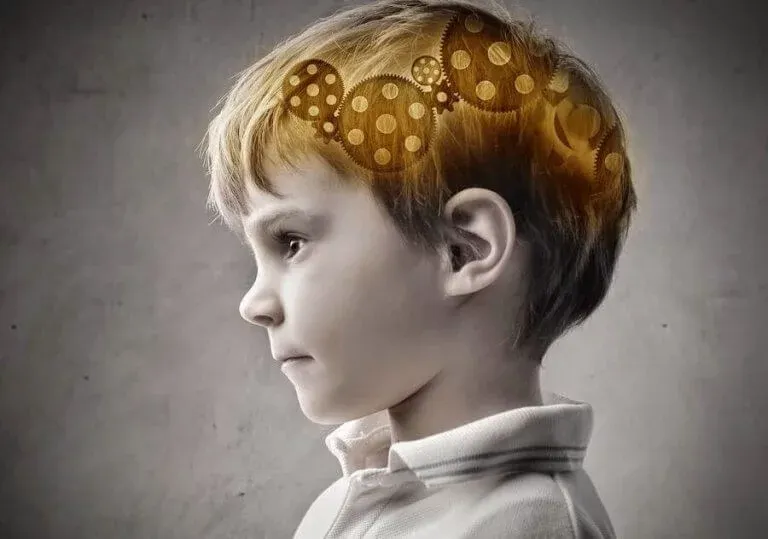
If you have answered yes to any of the above questions, we know that you are the mother of a small child. All children want to watch 250 times their favorite movie; sometimes, even repeat it when it has just finished. The same goes for songs, stories and games. Who has not spent half an hour playing "Where is Andrea? Here it is!"
Although to us after the twelfth repetition of "PinPon is a doll" we seem to want to light a match to the cardboard doll, there is a scientific reason why our children want to listen to it once more: their brain is made to learn by means of Repeating patterns.
This is the way in which the infant brain learns physical and practical skills, as well as the sense of the world in general.
Following an argument from a movie or a children's story, however simple it may seem, is a challenge and an effort for children. That is why they feel happy when they see it once more, they understand the thread a little better and it makes more sense to them.

Only a few months ago, half the world was surprised by a curious news. A Netflix user had watched the same movie 357 times over the course of a year. Most wanted to know two things: what production it was and who that particular person was. Finally, the well-known audiovisual platform contacted the user to get to know him and be able to publish his story.
A child may have seen more than 100 times that movie for which he feels a great predilection. However, no matter how many times you have seen it, your level of attention is the same as the first time.
Share
The film in question was neither more nor less than Bee Movie. A fun animated film where a bee recently graduated from university leaves her hive to make a beautiful friendship with a human, a florist. For its part, the user who had seen this production almost daily was Jaxson, a baby just over one year of age.
As the mother explained, the boy was only a couple of months old when he became fascinated with the images of this DreamWorks movie. So much so that since then there is no day when I do not put it on again. According to her, during the time that Bee Movie lasts, Jaxson is more relaxed and attentive than ever. She is aware that her son hardly understands anything, but in view of the satisfaction that she produces, she does not hesitate to give him that moment of delight and entertainment on a daily basis.
Why does it only work in children? What makes a song stop moving us when we are older?
The cause is the functioning of children's brains. They are prepared to learn skills by repeating patterns. And not only practical or physical skills (which explain the taste of children to play always the same games at recess, through the generations: to perfect through repetition), but the own sense of the world.
In the case of movies or television, even following a simple argument takes a lot of effort. Hence, every time they see the film, they feel happy to understand the thread better and better-the same case for stories, books and stories. Constant repetition not only allows them to develop better brain skills (linguistic and narrative), but "literal repetition-seeing the same content over and over again-improves understanding and learning. With younger children, repetition does not cause attention to decay, and it has been shown to increase audience participation. "
The repetition as a means of learning.
The infant brain learns and consolidates information through repetition. Therefore, it is not strange that children see the same movie over and over again, that they ask us to sing the same song or that they want us to read the same books to them. Thus, studies such as the one published in 2011 at the University of Sussex, Brighton show us that children integrate these stories as a pattern. They are chains of meaning that go deciphering better and better.

Constant repetition not only helps the development of language skills and narratives, but the ability to understand and learn.
Joan Wenter, a doctor in developmental psychology, explains: "once a child has mastered the dialogue of a film or the lyrics and dance of a song, he wants to celebrate his success by participating in what he has seen, so he wants to continue seeing it" .
So learning the song of the Mouskemarcha is a total success for your son and wants to show off. Many times.
In the case of children's films, the drawings, music and bright colors attract even more attention and make it even happier.
Do you know what is the greatest success of all? To be able to "predict the future". Once the children have seen Dora's chapter 200 times and can correctly answer the path they must take on the Map, they will prove to themselves their skill and competence. And that makes them feel incredible.
